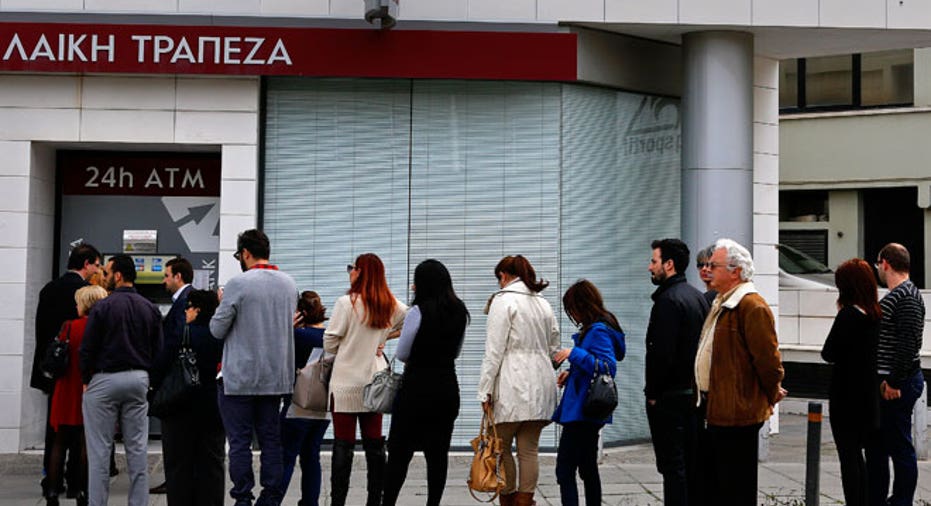Europe Chokes Moral Hazard: James Saft

Moral hazard may not be quite dead in Europe but it has a bad, hacking cough.
A new, tougher policy on banking bailouts, made flesh in Cyprus and enunciated by Dutch Finance Minister Jeroen Dijsselbloem, will shrink Europe's arguably overly-large banking system and, ultimately, may put unbearable pressure on the currency union.
Actually the policy, allowing holders of bonds and uninsured depositors in insolvent banks to actually lose money, is not so much new as a return to following the rules of capital structure, with equities taking the first loss and uninsured deposits the last to suffer.
It does mark a huge change from how Europe, and the U.S., have handled bad banks since the crisis began, sheltering creditors and depositors from the consequences of their risk-taking in ways that make them likely to take on more and sillier risks, a syndrome called moral hazard.
"If there is a risk in a bank, our first question should be 'Okay, what are you in the bank going to do about that? What can you do to recapitalise yourself?'," Dijsselbloem, who also heads the Eurogroup of euro zone finance ministers, told Reuters and the Financial Times.
"If the bank can't do it, then we'll talk to the shareholders and the bondholders, we'll ask them to contribute in recapitalising the bank, and if necessary the uninsured deposit holders," he said.
"It will force all financial institutions, as well as investors, to think about the risks they are taking on because they will now have to realize that it may also hurt them. The risks might come towards them."
After a first, and disastrous, plan which would have violated the spirit of an EU policy of insuring accounts of less than 100,000 euros, Cyprus, the EU and IMF eventually agreed a banking bailout which shielded small accounts and concentrated pain not only on those larger than the limit, but on depositors in the weakest banks.
Even more significant was the decision to force senior bondholders to accept losses. Both moves will give pause to investors who provide money to banks in Europe, who will likely now either decide this is not worth the risk, or who will demand better compensation for the hazards which now fall on them.
This is an excellent policy but one which is going to hurt a great deal. It is not simply that this partly undoes the policy of public insurance against private risks which generate private gain. It also acknowledges, tacitly, that the debts within the euro zone may be too large, that losses must be suffered to allow restructuring to happen on better foundations.
SHAME ABOUT THE COSTS
That's not to say this is a policy change without costs. The first fear is that it will spark a bank run, with large depositors fleeing banks in weaker economies like Spain or Italy, or in ones like Luxembourg in which the banking system dwarfs the rest of the economy.
This is certainly possible, and corporations, which have a legal duty to act in their shareholder's best interests, will likely leave the weakest banks in the most doubtful countries, if they have not already. That said, we saw little early signs of distress in financial markets. The Swiss franc rose against the euro, a sign of money flowing to safety, but not dramatically, and financial indicators didn't seem to show huge pressure on banks on the periphery of the euro zone.
What will happen, almost certainly, is that the cost of raising capital will go up for banks, with the weakest penalized the most. That is going to cause Europe's banking industry to shrink, hopefully slowly and over many years. While this is not going to be pleasant for those closely involved, the alternative is worse - keeping banks on a kind of reverse welfare in which the poor subsidize the rich in making bad decisions.
As banking shrinks a large problem is going to be the availability of loans from banks, and their cost. Europe is, in contrast to the U.S., heavily reliant on bank lending and with less well developed capital markets in which to sell bonds. With the continent already suffering from tough credit conditions, this is only going to increase the near term economic hit.
This is also going to increase pressure for a controlled breakup of the euro, and may make it inevitable. Cyprus, like Greece, is going to suffer a massive implosion of its economy without being able to devalue its currency. That may well prove intolerable.
Those two realizations; that investors need to look out for themselves and that the euro's center may not hold, are as big as they are scary.
(At the time of publication James Saft did not own any direct investments in securities mentioned in this article. He may be an owner indirectly as an investor in a fund. You can email him at jamessaft@jamessaft.com and find more columns at http://blogs.reuters.com/james-saft) (James Saft)
(James Saft is a Reuters columnist but his opinions expressed are his own.)



















